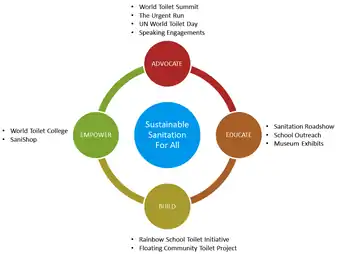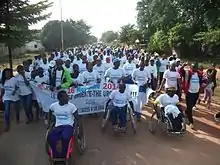World Toilet Organization
The World Toilet Organization (WTO) is a global non-profit organization whose goal is to improving toilet and sanitation conditions worldwide. It was founded in 2001[1] with 15 members and has now grown to 151 member organizations in 53 countries.[2] The WTO is also the organizer of the World Toilet Summit, the Urgent Run and initiated the United Nations World Toilet Day.[3]
 | |
| Formation | 2001 |
|---|---|
| Founder | Jack Sim |
| Type | Non-profit organization |
| Focus | Improving toilet and sanitation conditions |
| Headquarters | Singapore |
Region served | Worldwide |
| Method | Advocacy, capacity building, training, building market infrastructure, knowledge management, networking |
| Website | www |
Mission and history
WTO was founded by Jack Sim in Singapore on 19 November 2001.

Key pillars of WTO's work are:
- Advocate to change policy on sanitation: Through its global advocacy efforts, WTO hopes to break the taboo associated with sanitation. Its advocacy events include the annual World Toilet Summit, World Toilet Day and Urgent Run.
- Educate to change mind-sets on sanitation: WTO collaborates with grassroots organisations and schools to increase awareness of the importance of sanitation in local communities. It does this via public exhibition roadshows and school sanitation and hygiene promotion programs.
- Build to develop sanitation infrastructure and capacity: WTO builds toilet infrastructure in various schools and communities in several developing countries. It does this directly, for example through the Rainbow School Toilet Initiative in China or via its partners, for example in the Floating Community Toilet project in Cambodia.
- Empower to bring about long term social change on sanitation: WTO takes a market-based approach that empowers communities to solve their own sanitation challenges. This is done via the World Toilet College training model which builds capacity for sanitation workers and professionals and also via its social enterprise model, SaniShop.[4]
Activities
| Activities | Year | World Toilet Summits |
| Founded World Toilet Organization
Established World Toilet Day 19 Nov |
2001 | Singapore: 19 - 21 Nov |
| World Toilet Summit | 2002 | Seoul, South Korea: 21 Oct – 2 Nov |
| World Toilet Summit | 2003 | Taipei, Taiwan: 10–12 October |
| World Toilet Summit | 2004 | Beijing, China: 17 - 19 Nov |
| Launched World Toilet College | 2005 | Belfast, Northern Ireland: Sept 26 - 29 |
| Accredited by United Nations Environment Programme (UNEP) | 2006 | Moscow, Russia: Sept 6 - 9 |
| Co-founded Sustainable Sanitation Alliance (SuSanA) | 2007 | New Delhi, India: 30 Oct – 3 Nov |
| Partnered with ICC, USA for setting Global Standards & Codes for toilets | 2008 | Macau, China: 2 - 4 Nov |
| Launched Sanishop in Cambodia – World's 1st sanitation social enterprise | 2009 | Singapore: 2 - 4 Dec |
| World Toilet Summit | 2010 | Philadelphia, USA: 4 - 6 Dec |
| First local NGO to create and implement a Clinton Global Initiative (CGI) | 2011 | Hainan Island, China: 22 - 24 Nov |
| Launched Sanishop India in partnership with eKutir
Launched Sanishop Vietnam in partnership with Unilever |
2012 | Durban, South Africa: 4 - 6 Dec |
| United Nations adopted 19 Nov as UN World Toilet Day
Achieved special consultative status with the UN ECOSOC |
2013 | Solo, Indonesia: 1 - 4 Oct |
| Launched the Urgent Run for UN World Toilet Day | 2014 | |
| Launched Floating Toilet Community Project in partnership with Wetlands Work! | 2015 | New Delhi, India: 19 - 20 Jan |
| Launched World Toilet College in India with GIWA and Reckitt Benckiser
Launched Rainbow School Toilet Initiative in Henan Province, China Launched 50 Years of Sanitation Excellence Roadshow in Singapore |
2016 | Kuching, Malaysia: 27 - 29 Oct |
Founder
Jack Sim is the founder of the World Toilet Organization, the BoP HUB and is a global advocate for sanitation. Formerly in the construction industry, he founded WTO in 2001 after attaining financial independence at age of 40 and deciding to devote the rest of his life to social work. For "creating good will and bringing the subject into the open" and "mobilizing national support in providing on-the-ground expertise" Sim received the Schwab Foundation award for Social Entrepreneur of the Year in 2001. In 2007, Sim became one of the key members to convene the Sustainable Sanitation Alliance composed of key players for sanitation. He is an Ashoka Global Fellow, and was named one of the Heroes of the Environment for 2008 by Time magazine.[5]
Initiatives
World Toilet Day
WTD was founded on 19 November 2001 and the inaugural WTS was held on the same day. WTO recognized the need for an international day to draw global attention to the sanitation crisis – and so established World Toilet Day (WTD).[6] NGOs, the private sector, civil society organizations and the international community joined in to mark the global day. The United Nations also officially recognises this day due to the need to raise awareness about the world's sanitation crisis.[7]

Urgent Run
Each year, WTO commemorates WTD with the Urgent Run. The Urgent Run is a call for urgent action to end the sanitation crisis and aims to bring communities around the world together to raise awareness for the global sanitation challenge and engage people with sanitation issues in their local communities. For the past few years, in the lead-up to UN World Toilet Day, communities worldwide have come together to organize sanitation-themed Urgent Runs in varying formats and include fun runs, educational events, awareness walks, toilet cleaning programs, carnivals and even motorbike parades. They are organised by community groups, companies, universities, volunteers and NGOs to engage their local communities on their sanitation challenges.[8]
Rainbow School Toilet Initiative
WTO's Rainbow School Toilet Initiative was launched in 2015. In 2016 four rural schools, with an estimated 1,300 students (average 300 students per school) benefited from the new toilet buildings equipped with a recyclable wastewater treatment plant.[9]
Floating Community Toilet Project
Until 2018, no proper sanitation existed for the almost 100,000 people living in floating communities on Cambodia's Tonle Sap Lake.[10] To address sanitation issues in these floating communities, Wetlands Work! (WW) developed the HandyPod,[11] a product that contains the raw sewage and treats it by harnessing various biological processes. This project aims to eliminate open defecation by providing sanitation systems to floating schools and teaching students to use toilets; improve sanitation and hygiene; reduce school absences due to diarrhea; increase school attendance especially for girls, as well as driving demand for household toilets.
WTO and WW raised funds for the project through various platforms and in 2016 a total of eight HandyPods have been installed, befitting approximately 900 students and 650 indirect beneficiaries in their households.[12]
World Toilet College
The World Toilet College (WTC) started as a social enterprise in 2005 with the belief that there is a need for an independent world body to ensure best practices and standards in toilet design, cleanliness and sanitation technologies. While the lack of toilets is an endemic problem, poor management and hygienic maintenance are equally serious issues. A well-kept toilet will encourage proper usage and prevent deadly diseases.[13]
Since 2005 WTC has trained more than 5,000 people across its various courses and conducted programmes and courses.[14]
See also
- WASH (Water, Sanitation, Hygiene)
References
- Dueñas, Christina (2007). "Water for All". Archived from the original on 29 December 2011. Retrieved 10 March 2009.
- Sim, J. (2017). World Toilet. World Toilet. Retrieved 5 May 2017, from http://worldtoilet.org/who-we-are/our-story/
- World Toilet Day Official – A day to think and take action. (2016). Worldtoiletday.info. Retrieved 5 May 2017, from http://www.worldtoiletday.info/
- "Better Toilets for a Better World - Annual Report 2016" (PDF). 2016. p. 8. Retrieved 21 December 2021.
- "Awardees". Schwab Foundation for Social Entrepreneurship. Retrieved 21 December 2021.
- "Don't Laugh: World Toilet Day Aims to Promote Sanitation, Rid World of Disease". Fox News. 19 November 2008.
- "OECD celebrates World Toilet Day - OECD". www.oecd.org. Retrieved 21 December 2021.
- "What's the urgency?". The Urgent Run. Retrieved 14 November 2017.
- manic, & Sim, J. (22 March 2016). World Toilet. Retrieved 5 May 2017, from http://worldtoilet.org/delivering-hygiene-promotion-classes-to-the-students-of-tai-ping-primary-school-in-badong-county-hubei-province/
- "Safe toilets help flush out disease in Cambodia's floating communities". the Guardian. 15 February 2017. Retrieved 21 December 2021.
- "Floating Villages and The HandyPod". Wetlands Work!. 14 June 2013. Retrieved 21 December 2021.
- "World Toilet Organization Annual Report 2016" (PDF).
- "World Toilet College Set To Open In India". Forbes. 24 September 2015. (subscription required)
- "World Toilet College – World Toilet". Retrieved 14 April 2022.